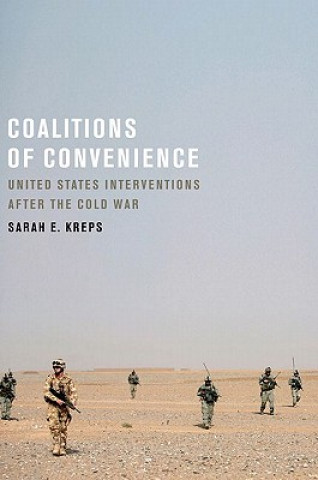
Kód: 01236709
Coalitions of Convenience
Autor Sarah E Kreps
When the Clinton Administration sent the United States military into Haiti in 1994, it first sought United Nations authorization and assembled a large coalition of allies. With a defense budget 20 times the entire GDP of Haiti, wh ... celý popis
- Jazyk:
 Angličtina
Angličtina - Väzba: Pevná
- Počet strán: 240
Nakladateľ: Oxford University Press Inc, 2011
- Viac informácií o knihe

Mohlo by sa vám tiež páčiť
-

What Is Ancient Philosophy?
30.63 € -6 % -

Innovation and Technology in Korea
137.81 € -

Single Nucleotide Polymorphisms
153.08 € -

Cancer Epigenetics
211.93 € -

Neural Computation, Neural Devices, and Neural Prosthesis
211.93 € -

Researching Design Learning
211.93 € -

Measures and Differential Equations in Infinite-Dimensional Space
163.60 € -

Erkenntnis Orientated: A Centennial Volume for Rudolf Carnap and Hans Reichenbach
211.93 € -

Automatic Control Systems 9e (WSE)
309.11 € -

German: An Essential Grammar
60.66 € -

Murder and Crime York
17.69 € -4 % -

Oxford Student Texts: William Shakespeare: Complete Sonnets
16.37 € -

Colinton Story
34.27 € -4 % -

Cambridge History of Nineteenth-Century Political Thought
205.26 €
Darujte túto knihu ešte dnes
- Objednajte knihu a vyberte Zaslať ako darček.
- Obratom obdržíte darovací poukaz na knihu, ktorý môžete ihneď odovzdať obdarovanému.
- Knihu zašleme na adresu obdarovaného, o nič sa nestaráte.
Viac informácií o knihe Coalitions of Convenience
Nákupom získate 269 bodov
 Anotácia knihy
Anotácia knihy
When the Clinton Administration sent the United States military into Haiti in 1994, it first sought United Nations authorization and assembled a large coalition of allies. With a defense budget 20 times the entire GDP of Haiti, why did the US seek multilateral support when its military could quickly and easily have overpowered the 7,600-soldier Haitian army? The US has enjoyed unrivaled military power after the Cold War and yet in eight out of ten post-Cold War military interventions, it has chosen to use force multilaterally rather than going alone. Why does the US seek allies when, as the case of Haiti so starkly illustrates, it does not appear to need their help? Why in other instances such as the 2003 Iraq War does it largely sidestep international institutions and allies and intervene unilaterally? In Coalitions of Convenience, Sarah E. Kreps answers these questions through a study of US interventions after the post-Cold War. She shows that even powerful states have incentives to intervene multilaterally. Coalitions and international organization blessing confer legitimacy and provide ways to share what are often costly burdens of war. But those benefits come at some cost, since multilateralism is less expedient than unilateralism. With long time horizons--in which threats are distant--states will welcome the material assistance and legitimacy benefits of multilateralism. Short time horizons, however, will make immediate payoffs of unilateralism more attractive, even if it means foregoing the longer-term benefits of multilateralism. Coalitions of Convenience ultimately shows that power may create more opportunities for states such as the US to act alone, but that the incentives are stacked against doing so. The implications of the argument go beyond questions of how the US uses force. They speak to questions about how the world works when power is concentrated in the hands of one state, how international institutions function, and what the rise of China and resurgence of Russia may mean for international cooperation and conflict.
 Parametre knihy
Parametre knihy
Zaradenie knihy Knihy po anglicky Society & social sciences Politics & government International relations
107.38 €
- Celý názov: Coalitions of Convenience
- Autor: Sarah E Kreps
- Jazyk:
 Angličtina
Angličtina - Väzba: Pevná
- Počet strán: 240
- EAN: 9780199753796
- ISBN: 0199753792
- ID: 01236709
- Nakladateľ: Oxford University Press Inc
- Hmotnosť: 468 g
- Rozmery: 237 × 161 × 21 mm
- Dátum vydania: 28. April 2011
Obľúbené z iného súdka
-

On Palestine
10.71 € -20 % -

Prisoners of Geography
11.11 € -22 % -

World Order
11.32 € -23 % -

International Relations, Global Edition
107.98 € -

Grand Chessboard
22.44 € -

Diplomacy
18.49 € -23 % -

Clash of Civilizations and the Remaking of World Order
16.78 € -17 % -

Hundred-Year Marathon
16.37 € -22 % -

The Spy and the Traitor
10.81 € -24 % -

Understanding the Intelligence Cycle
77.04 € -

Who Rules the World?
11.11 € -25 % -

Who Rules the World?
10.71 € -20 % -

Dead Aid
16.67 € -8 % -

World Order
16.37 € -2 % -

Adults In The Room
14.25 € -23 % -

Legacy of Ashes
17.99 € -15 % -

Evolution of Cooperation
18.60 € -

Strategic Vision
15.97 € -21 % -

Secret World
18.09 € -24 % -

Geopolitics and Geoculture
21.73 € -28 % -

Dawn of Eurasia
12.12 € -23 % -

How Spies Think
11.01 € -23 % -

Gaza in Crisis
12.12 € -23 % -

Planetary Cycles Mundane Astrology
22.64 € -

OVERTHROW : AMERICA'S CENTURY OF REGIME
26.79 € -1 % -

Is the EU Doomed?
24.46 € -

Directorate S
17.18 € -19 % -

Righteous Victims
23.65 € -5 % -

Europe's Border Crisis
44.79 € -

America's Strategy in World Politics
71.28 € -

Destroying Libya and World Order
19.61 € -1 % -

My Nationalist Pony
36.39 € -

Critical Practices in International Theory
215.07 € -

American Century and Beyond
20.21 € -18 % -

Heroic Failure
12.63 € -5 % -

Oxford Handbook of the European Union
57.12 € -

Rise and Kill First
16.57 € -23 % -

PEACE TO END ALL PEACE
20.82 € -23 % -

Tragedy of Great Power Politics
21.43 € -8 % -

Countdown to Zero Day
16.88 € -16 % -

Revenge of Geography
18.39 € -20 % -

Political Order and Political Decay
15.36 € -22 % -

Naked Diplomat
14.25 € -23 % -

Against Our Better Judgment
12.93 € -

After the Empire
15.76 € -

Legacy of Ashes
20.62 € -23 % -

Dragons and the Snakes
31.74 € -9 % -

Oxford IB Diploma Programme: Global Politics Course Book
59.04 € -

Emergency Sex (And Other Desperate Measures)
16.37 € -23 %
Osobný odber Bratislava a 2642 dalších
Copyright ©2008-24 najlacnejsie-knihy.sk Všetky práva vyhradenéSúkromieCookies



 21 miliónov titulov
21 miliónov titulov Vrátenie do mesiaca
Vrátenie do mesiaca 02/210 210 99 (8-15.30h)
02/210 210 99 (8-15.30h)